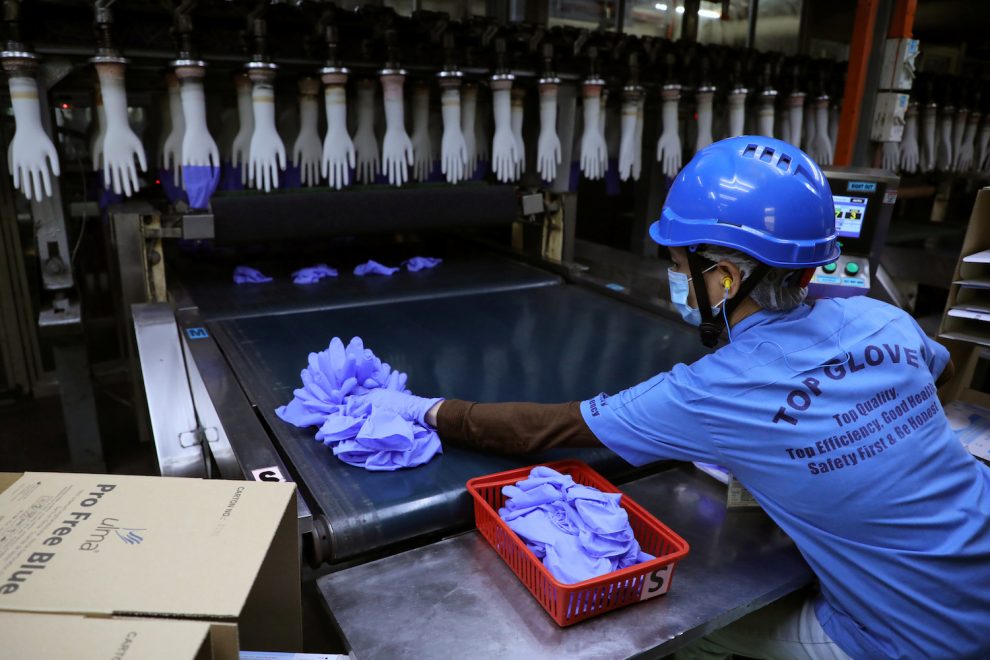Rubber gloves manufactured in Malaysia are among six items the US Department of Labor has added to a list of goods produced by forced labour this year, the department said in a report.
For Malaysia, the department had already listed electronics and garments as goods produced by forced labour, and palm oil as produced by child labour and forced labour.
“There are reports that adults are forced to produce rubber gloves in Malaysia. Forced labor predominately occurs among migrant laborers from Bangladesh, India, Myanmar, and Nepal working in more than 100 rubber glove factories throughout Malaysia,” the department said in the report, dated September.
The Department said reports showed an estimated 42,500 migrant workers were employed in the rubber glove industry, and were frequently subjected to high recruitment fees to secure employment that often kept them in debt bondage.
The workers were also forced to work longer hours than allowed under Malaysian law, and in factories where temperatures could reach dangerous levels, the department said.
The president of the Malaysian Rubber Glove Manufacturers Association (MARGMA), Supramaniam Shanmugam, said in a statement the report was retrospective and the industry abided by Malaysian laws and regulations, and by standards imposed by importing countries.
Remediation payments promised – and punishment
He said several major glove manufacturers had since June announced commitments of more than 250 million ringgit ($60.24 million) to remediate recruitment fees foreign workers paid to agents in their home countries that their Malaysian employers were unaware of.
“MARGMA members have reported that they are practicing immediate repatriation if any foreign worker pose debt-bondage risk or for being dishonest in claiming no debt-bondage during their entrance interviews,” he said, adding services of the recruitment agent responsible will be terminated in tandem.
The world’s largest glove maker, Malaysia’s Top Glove Corp, whose shipments to the United States were banned by the US Customs and Border Protection in July over allegations of forced labour, said this month it had raised its remediation payments to 136 million ringgit.
Malaysia’s human resources ministry cleared Top Glove of force labour practices after a raid on one of its factories in July.
Other issues the DOL reported were a threat of penalties, including withholding of wages and identification documents, and restricted movement.
‘Repatriation – the worst thing employers can do’
Andy Hall, an independent migrant worker rights specialist, who has been lobbying Malaysian glove manufacturers to improve conditions for workers from the Subcontinent for months, said on Thursday (Oct 15) he was shocked on today’s statement by MARGMA – that its members are now practicing “immediate repatriation if any foreign worker pose debt-bondage risk or for being dishonest in claiming no debt-bondage during their entrance interviews.”
“This disappointing announcement comes despite other related important and more welcome policy commitments, alongside measures such as foreign worker recruited fee and related costs reimbursements, also announced recently by the industry,” Hall said. “These developments have all happened due to increasing international pressure to address systemic and serious forced labour risks that remain inherent in gloves production processes in Malaysia that account for 70% of world rubber gloves supply.
“This ‘immediate repatriation’ policy is an ill-informed response .. It is the worst thing any employer or industry could plan to do to threaten to send often coerced or threatened unethically recruited foreign workers in debt bondage or forced labour back to their origin country simply for being in debt or not telling the truth.
“This is a counter-productive measure that, if implemented, would worsen a victim’s precarious situation with absolutely no concurrent deterrent impact towards ensuring more ethical recruitment systems into the future for such foreign workers desperate for work.
“Threatening to repatriate victims of unethical recruitment processes without understanding the wider context of their frequent unwillingness to tell the truth about their debt and/or payments they had to make to secure work is unacceptable and ineffective as an approach.
“Gloves industry management and staff have handsomely profited alongside Malaysian government officials, Malaysian agents as well as origin country agents and brokers (and other intermediaries) from the systemic corruption and extortion involved in unethical recruitment practices involving foreign workers into Malaysia over the years. It is this corruption and extortion that has led to foreign workers now working in Malaysia paying such high recruitment related fees and costs to origin and destination country agents and intermediaries and thus falling into debt bondage and high risks of forced labour in the first place.”
($1 = 4.1500 ringgit)
(Reporting by Reuters and ATF)
























